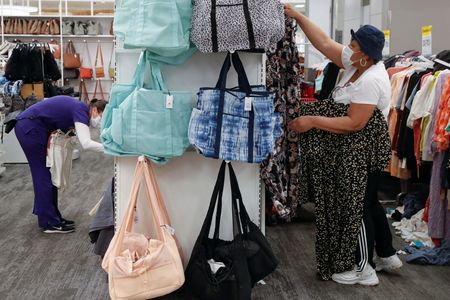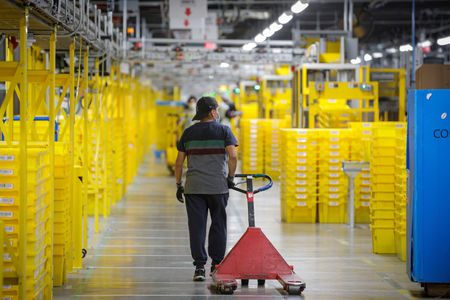

WASHINGTON (Reuters) – U.S. business inventories increased a bit less than expected in August, but there are signs that unsold goods are piling up at retailers and wholesalers as stubbornly high inflation and rising interest rates slow demand.
Business inventories rose 0.8% after climbing 0.5% in July, the Commerce Department said on Friday. Inventories are a key component of gross domestic product. Economists polled by Reuters had forecast inventories advancing 0.9%.
Inventories increased 18.2% on a year-on-year basis in August.
Retail inventories jumped 1.3% in August instead of 1.4% as estimated in an advance report published last month. That followed a 1.0% increase in July. Retailers are finding themselves saddled with excess merchandise, a function of both easing supply chain bottlenecks and slowing demand for goods.
That could see businesses offering price discounts and discourage some from placing more orders until they have cleared the unwanted stock, to the detriment of manufacturing and the broader economy in the coming year.
The oversupply of goods and the Federal Reserve’s aggressive monetary policy stance have left many economists expecting a recession in 2023.
The Fed has raised its policy rate from near-zero in March to the current range of 3.00% to 3.25% as it battles inflation. A fourth straight 75-basis-point interest rate hike is expected next month after data on Thursday showed inflation increasing strongly in September.
Motor vehicle inventories rose 3.5% instead of 3.7% as estimated last month. They advanced 3.5% in July.
Retail inventories excluding autos, which go into the calculation of GDP, increased 0.6% as estimated last month.
Wholesale inventories increased 1.3% in August. Stocks at manufacturers fell 0.1%.
For now, inventories are seen combining with a shrinking trade deficit to boost GDP in the third quarter. The Atlanta Fed is estimating that GDP increased at a 2.9% rate last quarter after falling at a 0.6% pace in the second quarter.
Business sales rebounded 0.3% in August after falling 1.0% in July. At August’s sales pace, it would take 1.33 months for businesses to clear shelves, up from 1.32 in July.
(Reporting by Lucia Mutikani; Editing by Chizu Nomiyama)

